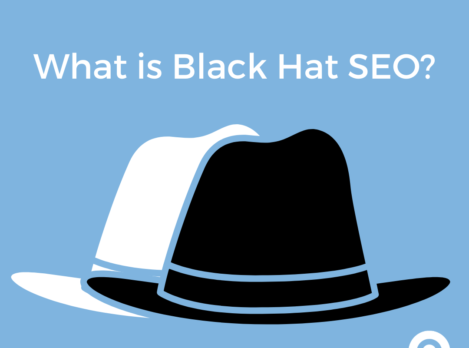Visibility in search results is vital for any business to be found by potential customers, but SEO is not simply adding as many keywords as possible to your website and hoping for the best.
There is a right way and a wrong way to SEO, and if you’ve ever seen a website with spammy, keyword-stuffed content, you’ve seen the dark side of SEO. Quality Search Engine Optimization takes time, research, and iteration to reap the rewards. Although using black hat SEO techniques may win you some gains in the short term, continued use will damage your presence on the SERP rather than improve it.
The industry has improved vastly over the last 15 years, and search engines have made significant strides to penalize domains that partake in these underhanded SEO practices. However, some websites can slip through the cracks, providing the searcher little to no value when they land on the website.
We’ve covered the most common black hat SEO strategies, so you know what not to do as you develop your organic search strategy.
Black Hat SEO
Black hat SEO is the act of gaming Google’s algorithms to rank on the search engine results page (SERP). The strategy uses several shady shortcuts to rank on the search engine results page. Black hat SEO has damaged the reputation of SEO agencies; however, the industry has become much more credible in recent years by using tactics that work with Google’s algorithm, not against it.
Black Hat SEO Tactics
Keyword Stuffing Content
Keyword stuffing is filling your content with way too many keywords to rank well for your core products or services. Adding several variants of keywords where they do not add value to potential customers makes for a bad user experience and could cause your website to rank for irrelevant keywords.
Examples from Google:
- Blocks of text listing cities and states a web page is trying to rank for
- Repeating the same words or phrases so often that it sounds unnatural
Cloaking
Cloaking is the attempt to show a particular piece of content to users or potential customers, and a different piece of content to search engines. This is often done so spam websites can rank for queries that are not relevant to the intent of the website.
Altering your website content for different users or devices is acceptable. You may choose to remove some content for users visiting your website from a mobile device or change the language of a page based on where the user is searching from. These are acceptable changes and shouldn’t be confused with cloaking. If you are not changing the pages that appear for users vs. search engines, you have flexibility to alter the content on your website if it helps improve user experience.
Black Hat Redirects
Page redirects are used quite often on a website and are acceptable to use in most cases. For example, if you have removed a page on your website, you may decide to redirect the link back to a page that is relevant to users.
Like cloaking, black hat redirects involve redirecting a search engine crawler to a specific page, and live users to another. Black hat SEO’s may redirect a page with significant authority to an irrelevant page to boost its position in the SERP. A 301 redirect passes a significant amount of page authority from one page to another, so this tool can be manipulated to boost rankings for any given page.
Poor Page Content & Invisible Keywords
Adding spammy content that is of zero value to the searcher is mostly a thing of the past, but can still be found online especially in some industry verticals. A common black hat SEO tactic was to hide invisible keywords in content, so search engines would crawl the content, but the user couldn’t see it. This tactic is now less effective since the Google Search Engine algorithms are much better at interpreting natural language, not merely counting keywords on a page. Google also continues to make improvements to their ability to detect these tactics, notably the notorious Google “Panda” update in 2011.
Today, sites leveraging these tactics can take an instant hit in search rankings, often causing more harm than good to a website’s organic visibility.
Paid Links
Google strictly prohibits the buying and selling of links, stating that any links that are leveraged to manipulate a website’s ranking is in violation of their webmaster guidelines.
Although having good quality links back to your website can signal to Google that you are an authority in your industry, if you are purchasing these links, you will signal to Google that you may be part of a link scheme, which is in direct violation of Google’s Webmaster Guidelines.
Black Hat Schema
Schema, also known as structured data, is a very important tool in any SEO’s toolkit. Schema is a code-based language that can be understood by search engines better than natural language. Schema can be used to explicitly signal to the search engines what content is on the page. You can add schema to a webpage content, recipes, reviews, people, locations, products, and services.
Black hat schema is the act of adding inaccurate information to these snippets to fool Google. Although it may be difficult to determine if structured data has been manipulated, Google encourages users to report websites partaking in this black hat practice.
Link Farms
A link farm is a cluster of websites that all link to other sites in the group for the sole purpose of increasing SEO rankings. Most link farms are created using automated programs and services. This is still a widely used black hat SEO tactic.
These websites are filled with hundreds and thousands of links and typically contain the target keyword in the anchor text. Because Google’s algorithm ranks websites by looking at the number of links that point to a specific website (among several other ranking factors), this tactic exploits the algorithm.
It is recommended to use a backlink tool to analyze your website backlinks and ensure that link farms aren’t capitalizing on your website’s authority. You can remove and blacklist poor quality websites that link to your site using Google’s Disavow Tool in Google Search Console.
Private Blog Networks
A Private Blog Network (PBN) is a network of websites used for link building schemes. Like link farms, the goal of these networks is to increase domain authority of websites in search engines.
Those who use this back hat SEO tactic will buy old or expired domains that have a history with domain authority. They will add links back to their own site through the expired domain to signal to Google that their site is credible and authoritative.
Blog Comment Spam
Blog comment spam, while not necessarily a black hat SEO tactic, is a borderline shady tactic that involves including a link to your website in a comment on a blog of another website. Google now discounts any links included in a blog comments section. The majority of popular blogging websites default links in comments “nofollow”, which means the website that these users are commenting on does not pass on any authority to the links within the comments.
Despite the decline in utilization of this black hat practice, some individuals still attempt to sell blog commenting services. If you have a publication or a blog forum, it’s recommended to ensure your comments cannot be spammed by users and bots alike.
What about Grey Hat SEO?
Why are there so many hats in SEO? What do they all mean?
Grey hat SEO is somewhere in the middle of black and white hat SEO. If you aren’t sure if a particular tactic you’re using is white hat or black hat, it is likely a grey hat SEO technique.
Grey hat SEO usually consists of tactics that may not be against search engine best practices but could still be banned in the future. In any case, if your business depends on website traffic, we recommend that you stick to best practices and produce valuable, optimized content rather than veer off into grey or black hat SEO techniques.
How to Create an Update-Proof White Hat SEO Strategy
The search engine ranking algorithms are smarter. While there is still an entire industry based around black-hat SEO tactics, this is a truly risky approach to any business that relies on website traffic from Google and Bing. Search engines have improved in their efforts to catch black hat SEOs red-handed. Using a black hat tactic can lead to a manual action by Google (think of it as an official warning), or your website being deindexed (removed from the search results). When this happens, it is very difficult to recover from. Think short term gain for long term pain.
The above tactics serve as a warning of what not to do when you’re building your organic search strategy. If you are struggling to come up with ways to increase your visibility online while following best practices, let’s talk about what we can do to get you found online.
Stay tuned for our next blog on white hat SEO techniques you can feel good about.







